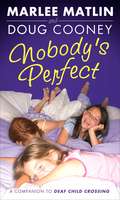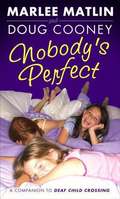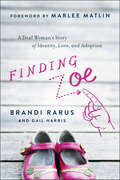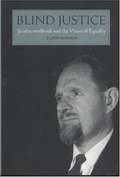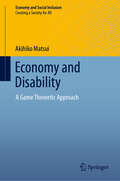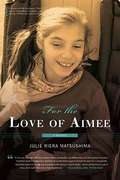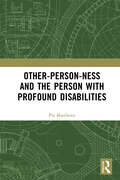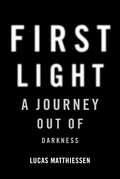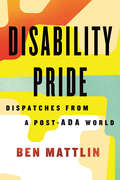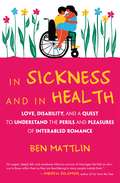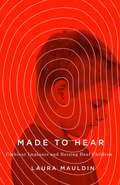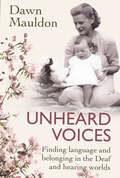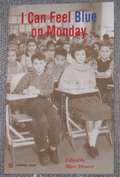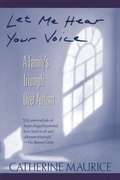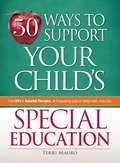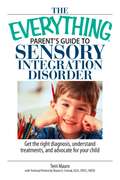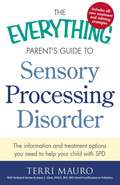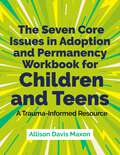- Table View
- List View
Nobody's Perfect
by Marlee Matlin Doug CooneyMegan has spent forever planning her positively purple birthday sleepover. She's even made glittery purple invitations for every girl in her class. Then a new girl, Alexis Powell, joins their class. Alexis seems perfect: She's smart, pretty, and rules the soccer games on the playground. But no matter how hard Megan tries to be a friend to Alexis, the new girl is aloof or rude. At first Megan thinks Alexis is shy. Then Megan starts to fear that Alexis is treating her differently because she's deaf. When the girls are forced to collaborate on a science fair project, Megan learns the truth -- and realizes that nobody's perfect. Once again Marlee Matlin draws on experiences from her own childhood to tell Megan's story. In this funny, poignant book, readers will root for Megan, a spirited young girl who doesn't let anything stand in her way.
Nobody's Perfect
by Marlee Matlin Doug Cooney"She's practically perfect," Megan said thoughtfully. She repeated the new girl's name, practicing the way Ms. Endee had written it on the whiteboard. Alexis Powell. Megan has spent forever planning her positively purple birthday sleepover. She's even made glittery purple invitations for every girl in her class. Then a new girl, Alexis, joins their class. Alexis seems perfect: She's smart, pretty, and rules the soccer games on the playground. But no matter how hard Megan tries to be a friend to Alexis, the new girl is aloof or rude. At first, Megan thinks Alexis is shy. Then Megan starts to fear that Alexis is treating her differently because she's deaf. When the girls are forced to collaborate on a science fair project, Megan learns the truth -- and realizes that nobody's perfect. Once again Marlee Matlin draws on experiences from her own childhood to tell Megan's story. In this funny, poignant book, readers will root for Megan, a spirited young girl who doesn't let anything stand in her way.
Finding Zoe: A Deaf Woman's Story of Identity, Love, and Adoption
by Marlee Matlin Brandi Rarus Gail Harris<P>At just a few months old, Zoe was gradually losing her hearing. Her adoptive parents loved her-yet agonized-feeling they couldn't handle raising a Deaf child. Would Zoe go back into the welfare system and spend her childhood hoping to find parents willing to adopt her? Or, would she be the long-sought answer to a mother's prayers? <P>Brandi Rarus was just 6 when spinal meningitis took away her hearing. Because she spoke well and easily adjusted to lip reading, she was mainstreamed in school and socialized primarily in the hearing community. Brandi was a popular, happy teen, but being fully part of every conversation was an ongoing struggle. She felt caught between two worlds-the Deaf and the hearing. <P>In college, Brandi embraced Deaf Culture along with the joys of complete and effortless communication with her peers. Brandi went on to become Miss Deaf America in 1988 and served as a spokesperson for her community. It was during her tenure as Miss Deaf America that Brandi met Tim, a leader of the Gallaudet Uprising in support of selecting the university's first Deaf president. The two went on to marry and had three hearing boys-the first non-deaf children born in Tim's family in 125 years. <P>Brandi was incredibly grateful to have her three wonderful sons, but couldn't shake the feeling something was missing. She didn't know that Zoe, a six-month-old Deaf baby girl caught in the foster care system, was desperately in need of a family unafraid of her different needs. Brandi found the answer to her prayers when fate brought her new adopted daughter into her life. <P>Set against the backdrop of Deaf America, Finding Zoe is an uplifting story of hope, adoption, and everyday miracles.
Blind Justice: Jacobus ten-Broek and the Vision of Equality
by Floyd Matson<P>This is the long-awaited biography of Dr. Jacobus ten-Broek, legal scholar, UC Berkeley professor, and leader of the blind movement until his death in 1968. <P>Dr. Floyd Matson was a long-time collaborator with Dr. ten-Broek, authoring several books together, and perhaps the man who is most familiar with ten-Broek's work, and his life alive today. Dr. ten-Broek, pupil of Dr. Newel Perry, teacher at the California School for the Blind, was present at the creation of the National Federation of the Blind in 1940, and was its spiritual, intellectual, and political leader until ten-Broek's death in 1968. <P>This is a must-read for all those interested in the man at the center of a movement for over 30 years, whose legacy and inspiration is still felt today among blind activists around the world.
Economy and Disability: A Game Theoretic Approach (Economy and Social Inclusion)
by Akihiko MatsuiSociety has developed so that it accommodates the needs of intertwined people, but a question arises as to which people have been accommodated. Has everyone been taken care of in an equal manner? If not, who has fallen into the gap between the institutions that are supposed to accommodate them? This book is a study of these issues of economy and disability using game theory, which has provided a means of analyzing various social phenomena. Part I provides actual cases related to economy and disability, with the stories based on interviews by the author. Part II is geared toward a game theoretic analysis. This book explains disability-related issues by game theory and innovates that theory by deeply contemplating the issues.It is not common that first-rate theorists manage to make their research relevant and applicable to the most pressing problems our society faces these days. This is the remarkable achievement of this book. Akihiko Matsui, an internationally recognized leader in economic theory, succeeds in bringing profound game theoretical insights to the questions of disability, the social norms relating to it, and the ethical and economic problems they raise. The book is a tour de force, brilliantly combining economic and sociology, mathematics and philosophy, to provide us a fresh look at the way we run modern societies.Itzahk Gilboa, Professor, Eitan Berglas School of Economics, Tel-Aviv University and Professor of Economics and Decision Sciences, HEC, ParisThe present world faces a broad range of societal problems such as discrimination against minorities and conflicts between groups. The market mechanism may solve some of these dilemmas, but many others remain. This book targets various societal problems and provides game theoretical approaches to them, stressing the importance of social institutions including the market system and individual interactive attitudes to society. Aki Matsui’s splendid Economy and Disability is indispensable for students and scholars interested in social science, particularly in economic theory, and gives a better understanding of these phenomena and their potential cures.Mamoru Kaneko, Professor, Faculty of Political Science and Economics, Waseda UniversityIn this book, Aki Matsui is revealed to be a fully-fledged humanist in the guise of a game theoretician. He beautifully presents game-theoretical ideas while at the same time suggesting how society should relate to the disabled. This unique combination makes Economy and Disability—apart from anything else—a truly moving book.Ariel Rubinstein, Professor of Economics, Eitan Berglas School of Economics, Tel-Aviv University and Professor of Economics, New York University
HIV/AIDS Prevention: A Guide for Working with People Who Are Blind or Visually Impaired
by Judy Matsuoka Christine E. Pawelski. Gaylen KappermanThis manual is designed to help rehabilitation teachers, educators, and other practitioners who work with blind and visually impaired persons provide their clients with the facts they need to deal with the issues concerning HIV/AIDS.
For the Love of Aimee: A Memoir
by Julie Riera MatsushimaA story of a grandmother's sacrifice and devotion to a beautiful baby girl who was diagnosed with massive irreparable brain damage. Aimee was one of the twin grandchildren born to author Julie Riera Matsushima. The author inspires the reader by demonstrating that supportive and involved grandparents can and do make a difference and invites the reader to share in the disappointments, challenges and amazing accomplishments Julie and Aimee experience together during Aimee's first ten years.
Other-person-ness and the Person with Profound Disabilities
by Pia MatthewsMany people think that profound disability presents us with a real problem, often because it seems difficult to connect with someone who does not seem to think or act like us. Positioning profound disability in this way immediately sets up a ‘them’ and ‘us’, where the person with profound disability becomes the problematic ‘other’. Attempts to bridge the ‘them’ and ‘us’ risk reducing everyone to the same where disability is not taken seriously.In contrast to a ‘them’ and ‘us’, and negative connotations of the other found in the existentialist philosophies of writers like Sartre and Beauvoir, Pia Matthews argues for a return to a positive view of the other. One positive approach to the other, based on an ethics of relationship as championed by Levinas, seems to mitigate the other-ness of profound disability. However, this still makes the person with profound disability dependent on the ethical concern of the more powerful other. Instead, this book argues for return to a personalist philosophy of being offered by Mounier, Marcel, and Wojtyła, and deepened by participation, belonging, and the possibility of contributing to the good of all. This deepened philosophy of being gives a more solid foundation for people who are especially at the mercy of others. It will be of interest to all scholars and students of disability studies, philosophy and anthropology.
First Light: A Journey Out of Darkness
by Lucas MatthiessenA deeply felt literary memoir of one man&’s journey to redemption through vision loss, alcoholism, and the burden of a family legacy. Born to the author Peter Matthiessen, young Lucas traveled through life believing himself a disappointment to his famous father. From an early age, Lucas was exposed to the fanciful ideas of his parent&’s group of renowned bohemians as well as to their addictive pastimes. Within the shadow of his father&’s professional success came another source of darkness—the deterioration of Lucas&’s vision from retinitis pigmentosa. With blindness looming imminently, Lucas spirals downward, unsure of how to turn his degree in English Literature into a job and relying more and more on alcohol. As Lucas&’ drinking and eyesight worsen, so too do his interpersonal relationships and first career in publishing.First Light is a memoir of loss and learning. By pulling himself out of addiction and accepting that he will lose his sight completely, Lucas transitions from being &“the son of&” someone famous to an individual with his own strong sense of self. Despite continued personal tragedies, Lucas develops a second sight that is aimed inward, laying his triumphs and failures bare.With great honesty, Lucas Matthiessen creates a vivid portrait of self-destruction and rebirth, which is, above all, a vision of hope.
Disability Pride: Dispatches from a Post-ADA World
by Ben MattlinAn eye-opening portrait of the diverse disability community as it is today, and how disability attitudes, activism, and representation have evolved since the passage of the Americans with Disabilities Act (ADA)In Disability Pride, disabled journalist Ben Mattlin weaves together interviews and reportage to introduce a cavalcade of individuals, ideas, and events in engaging, fast-paced prose. He traces the generation that came of age after the ADA reshaped America, and how it is influencing the future. He documents how autistic self-advocacy and the neurodiversity movement upended views of those whose brains work differently. He lifts the veil on a thriving disability culture—from social media to high fashion, Hollywood to Broadway—showing how the politics of beauty for those with marginalized body types and facial features is sparking widespread change.He also explores the movement&’s shortcomings, particularly the erasure of nonwhite and LGBTQIA+ people that helped give rise to Disability Justice. He delves into systemic ableism in health care, the right-to-die movement, institutionalization, and the scourge of subminimum-wage labor that some call legalized slavery. And he finds glimmers of hope in how disabled people never give up their fight for parity and fair play.Beautifully written, without anger or pity, Disability Pride is a revealing account of an often misunderstood movement and identity, an inclusive reexamination of society&’s treatment of those it deems different.
In Sickness and in Health: Love, Disability, and a Quest to Understand the Perils and Pleasures ofInterabled Romance
by Ben MattlinA frank, humorous exploration of interabled dating, love, and marriageBen Mattlin’s wife, ML, recalls falling in love with his confidence and sheer determination. On one of their earliest dates, he persuaded her to ride on his lap in his wheelchair on their way home from an Elvis Costello concert. Thirty years later, they still travel like this from time to time, undaunted by the curious stares following them down the street.But In Sickness and in Health is more than an “inspiring” story of how a man born with spinal muscular atrophy—a congenital and incurable neuromuscular condition—survived childhood, graduated from Harvard, married an able-bodied woman, built a family with two daughters and a cat and a turtle, established a successful career in journalism, and lived happily ever after. As Mattlin considers the many times his relationship has been met with surprise or speculation by outsiders—those who consider his wife a “saint” or him just plain “lucky” for finding love—he issues a challenge to readers: why should the idea of an “interabled” couple be regarded as either tragic or noble?Through conversations with more than a dozen other couples of varying abilities, ethnic backgrounds, and orientations, Mattlin sets out to understand whether these pairings are as unusual as onlookers seem to think. Reflecting on his own experience he wonders: How do people balance the stresses of personal-care help with the thrill of romance? Is it possible that the very things that appear to be insurmountable obstacles to a successful relationship—the financial burdens, the physical differences, the added element of an especially uncertain future—could be the building blocks of an enviable level of intimacy and communication that other couples could only dream of?We meet Shane Burcaw, a twenty-three-year-old writer, who offers a glimpse of his first forays into dating with a disability. There’s Rachelle Friedman, the “paralyzed bride,” as the media refers to her, and her husband, discussing the joys and challenges of a new marriage and a growing family. And Christina Crosby and her partner, Janet Jakobsen, reflect on how Crosby’s disabling accident called for them to renegotiate their roles and expectations in their long-term relationship. What emerges is a candid glimpse into the challenges and joys of interabled love—from the first blush of sexual awakening to commitment and marriage and through to widowhood.
Made to Hear: Cochlear Implants and Raising Deaf Children
by Laura MauldinA mother whose child has had a cochlear implant tells Laura Mauldin why enrollment in the sign language program at her daughter's school is plummeting: "The majority of parents want their kids to talk." Some parents, however, feel very differently, because "curing" deafness with cochlear implants is uncertain, difficult, and freighted with judgment about what is normal, acceptable, and right. Made to Hear sensitively and thoroughly considers the structure and culture of the systems we have built to make deaf children hear.Based on accounts of and interviews with families who adopt the cochlear implant for their deaf children, this book describes the experiences of mothers as they navigate the health care system, their interactions with the professionals who work with them, and the influence of neuroscience on the process. Though Mauldin explains the politics surrounding the issue, her focus is not on the controversy of whether to have a cochlear implant but on the long-term, multiyear undertaking of implantation. Her study provides a nuanced view of a social context in which science, technology, and medicine are trusted to vanquish disability--and in which mothers are expected to use these tools. Made to Hear reveals that implantation has the central goal of controlling the development of the deaf child's brain by boosting synapses for spoken language and inhibiting those for sign language, placing the politics of neuroscience front and center.Examining the consequences of cochlear implant technology for professionals and parents of deaf children, Made to Hear shows how certain neuroscientific claims about neuroplasticity, deafness, and language are deployed to encourage compliance with medical technology.
Unheard Voices: Finding language and belonging in the Deaf and hearing worlds
by Dawn MauldonIn this poignant and powerful memoir, the author tells the story of their childhood growing up with Deaf parents. Through intimate and evocative prose, Dawn explores the challenges and joys of living in a world that is often hostile and unwelcoming to those who are different.From the isolation and challenges that come with being a child of Deaf parents, to the strength and resilience that comes with love and belonging, the author shares their unique and deeply personal perspective on what it means to see and communicate in a richly silent world.This book is a must-read for anyone interested in the Deaf experience, and the power of love and belonging to overcome adversity. Beautifully written and deeply moving, Unheard Voices is an exploration of what it means to be a part of a diverse and vibrant culture.
The Car, The Sled, and The Butch Wax
by Marc MaurerIn this book, successful people (who happen to be blind) tell stories which illustrate coping strategies while amusing the reader. Young adults will find courage in these true sharings. Can a person who is blind really do almost anything by using alternate techniques? What are those techniques? These eight people share a few of them. When a student teacher is faced with schoolchildren who have a sledding day planned, will a white cane be enough? Can a man without sight possibly rebuild a car's engine? When a young girl tests butch wax on her long tresses, does her hair ever return to its normal state? Whose fault is it when a person who is blind opens a taxicab door onto the side of a shiny, new SUV? These experiences delight, challenge and inform. This file should make an excellent embossed braille copy.
I Can Feel Blue On Monday
by Marc MaurerThe title vignette involves a teacher who is determined that a young boy (who is blind) should be able to feel the color of the piece of paper which she gives him. When he assures her that this is not possible, the teacher badgers him until he answers: "I can feel blue on Monday." He is sent to the principal's office for punishment. The principal is a wise man, and the "punishment" is quite fun. "The present volume, I Can Feel Blue on Monday, is number nineteen in the [Kernel Book] series. Here you will meet old friends and new-the real blind men and women whose stories tell what blindness is and, perhaps equally important, what it is not. Although our problems often seem complex, they frequently result from simple matters of misunderstanding and lack of information. ... How does a blind tourist absorb the splendor of the palace of the Imperial Chinese Emperor? What about the woman with failing eyesight who can no longer see the beautiful wings of a butterfly-can she no longer hope to experience those magical moments of beauty which once moved her to tears? And, finally, if (as Thomas Edison once said) 80 percent of all we learn comes through the eye, can our hope for normal lives be anything more than a futile dream?
Summit
by Marc MaurerIn this book you will meet "a blind college student worrying about meeting the challenges of his summer job as a camp counselor, a blind grandmother who wants to share storybooks with her baby granddaughter, a teen-ager fearing the loss of physical freedom she thought would necessarily accompany the loss of eyesight, and a second-grader hurt by his school teacher's obvious disdain for her blind students." Other books in this series are available from Bookshare.
Let Me Hear Your Voice: A Family's Triumph Over Autism
by Catherine MauriceShe was a beautiful doe-like child, with an intense, graceful fragility. In her first year, she picked up words, smiled and laughed, and learned to walk. But then Anne-Marie began to turn inward. And when her little girl lost some of the words she had acquired, cried inconsolably, and showed no interest in anyone around her, Catherine Maurice took her to doctors who gave her a devastating diagnosis: autism. In their desperate struggle to save their daughter, the Maurices plunged into a medical nightmare of false hopes, "miracle cures," and infuriating suggestions that Anne-Marie's autism was somehow their fault. Finally, Anne-Marie was saved by an intensive behavioral therapy. Let Me Hear Your Voice is a mother's illuminating account of how one family triumphed over autism. It is an absolutely unforgettable book, as beautifully written as it is informative. "A vivid and uplifting story ... Offers new strength to parents who refuse to give up on their autistic children." -- Kirkus Reviews. "Outstanding ... Heartfelt ... A lifeline to families in similar circumstances." -- Library Journal.
50 Ways to Support Your Child's Special Education
by Terri MauroMore than six million students in the U.S. receive special education services and that number is on the rise. Frequent changes in educational philosophy and special-education law have made it increasingly difficult for parents to establish an appropriate education plan for their children. This book looks at the many ways that parents can advocate for their children. including how to:Communicate with teachersGet homework doneBecome involved at schoolEnsure their children are well restedStart a school day on the right footAdvocacy comes in all forms, and sometimes it's as simple as helping people get to know their child and family in a positive way. This useful book will serve as an invaluable tool for parents looking to establish the best educational plan for their children.
50 Ways to Support Your Child's Special Education: From IEPs to Assorted Therapies, an Empowering Guide to Taking Action, Every Day
by Terri MauroMore than six million students in the U.S. receive special education services and that number is on the rise. Frequent changes in educational philosophy and special-education law have made it increasingly difficult for parents to establish an appropriate education plan for their children. This book looks at the many ways that parents can advocate for their children. including how to:Communicate with teachersGet homework doneBecome involved at schoolEnsure their children are well restedStart a school day on the right footAdvocacy comes in all forms, and sometimes itÆs as simple as helping people get to know their child and family in a positive way. This useful book will serve as an invaluable tool for parents looking to establish the best educational plan for their children.
50 Ways to Support Your Child's Special Education
by Terri MauroMore than six million students in the U. S. receive special education services and that number is on the rise. Frequent changes in educational philosophy and special-education law have made it increasingly difficult for parents to establish an appropriate education plan for their children. This book looks at the many ways that parents can advocate for their children. including how to: Communicate with teachers Get homework done Become involved at school Ensure their children are well rested Start a school day on the right foot Advocacy comes in all forms, and sometimes it's as simple as helping people get to know their child and family in a positive way. This useful book will serve as an invaluable tool for parents looking to establish the best educational plan for their children.
The Everything Parent's Guide To Sensory Integration Disorder: Get the Right Diagnosis, Understand Treatments, And Advocate for Your Child
by Terri MauroFor kids living with Sensory Integration Disorder, the world can be a scary place, full of potentially stressful experiences. Kids with Sensory Integration Disorder can howl in discomfort over the feel of a shirt tag or a sock seam on bare skin. They may find the sound of a whisper to be as loud and frightening as a siren, and may perceive the caring touch of a parent or jostling in the school lunch line as equivalent to an assault.The Everything Parent's Guide to Sensory Integration Disorder:Provides an in-depth definition of Sensory Integration Disorder and explains its effectsHighlights occupational therapy treatments and explains techniques you can use outside of the therapist's office to calm your childIncludes helpful advice for parents teaching their children how to deal with this disorder at school, home, and play, from childhood through adulthoodIn The Everything Parent's Guide to Sensory Integration Disorder, you'll find the answers you need as you search for ways to help your child. This reassuring handbook examines various forms of treatment and therapy, and provides professional advice for helping children with SID succeed in school, at home, and with friends.
The Everything® Parent's Guide To Sensory Integration Disorder
by Terri MauroThis reassuring handbook examines various forms of treatment and therapy, and provides professional advice for helping children with SID succeed in school, at home, and with friends.
The Everything Parent's Guide to Sensory Processing Disorder: The Information and Treatment Options You Need to Help Your Child with SPD
by Terri MauroIf your child has been diagnosed with sensory processing disorder (SPD), you understand how simple, everyday tasks can become a struggle. With The Everything Parent's Guide to Sensory Processing Disorder, you can help your child learn how to reduce stress and minimize the symptoms of SPD. In this all-in-one guide, Terri Mauro provides all the information you need regarding SPD, including:An in-depth definition of SPD and its effects.The newest treatments, therapies, and diets.Techniques for use outside of the therapist's office.The latest research on physical causes of SPD.Advice for coping at school, home, and play. Your child deserves to live a life free of the difficulties SPD can bring. The Everything Parent's Guide to Sensory Processing Disorder gives you professional advice to help your child to manage sensory needs and feel calmer, happier, and in control, now and in the future.
The Everything Parent's Guide to Sensory Integration Disorder
by Terri Mauro Sharon A. CermakFor kids living with Sensory Integration Disorder, the world can be a scary place, full of potentially stressful experiences. Kids with Sensory Integration Disorder can howl in discomfort over the feel of a shirt tag or a sock seam on bare skin. They may find the sound of a whisper to be as loud and frightening as a siren, and may perceive the caring touch of a parent or jostling in the school lunch line as equivalent to an assault.The Everything Parent's Guide to Sensory Integration Disorder:Provides an in-depth definition of Sensory Integration Disorder and explains its effectsHighlights occupational therapy treatments and explains techniques you can use outside of the therapist's office to calm your childIncludes helpful advice for parents teaching their children how to deal with this disorder at school, home, and play, from childhood through adulthoodIn The Everything Parent's Guide to Sensory Integration Disorder, you'll find the answers you need as you search for ways to help your child. This reassuring handbook examines various forms of treatment and therapy, and provides professional advice for helping children with SID succeed in school, at home, and with friends.
The Seven Core Issues in Adoption and Permanency Workbook for Children and Teens: A Trauma-Informed Resource
by Allison Davis MaxonBased on the pioneering Seven Core Issues model, this resource is an accessible and age-appropriate way to support children and teens who have experienced early adversity, to strengthen understanding and healing. The Seven Core Issues are Loss, Rejection, Shame/Guilt, Grief, Identity, Intimacy and Mastery/Control. This resource combines two separate interactive workbooks - one for children developmentally aged 5-11, the other for children developmentally aged 12+. These can be filled in, photocopied or downloaded and provide a structured way for children and teens to explore their feelings and beliefs using exercises and activities. An ideal accompaniment to the Seven Core Issues Workbook for Parents of Traumatized Children and Teens, this resource will be valued by all adults supporting children who have experienced early adversity.
